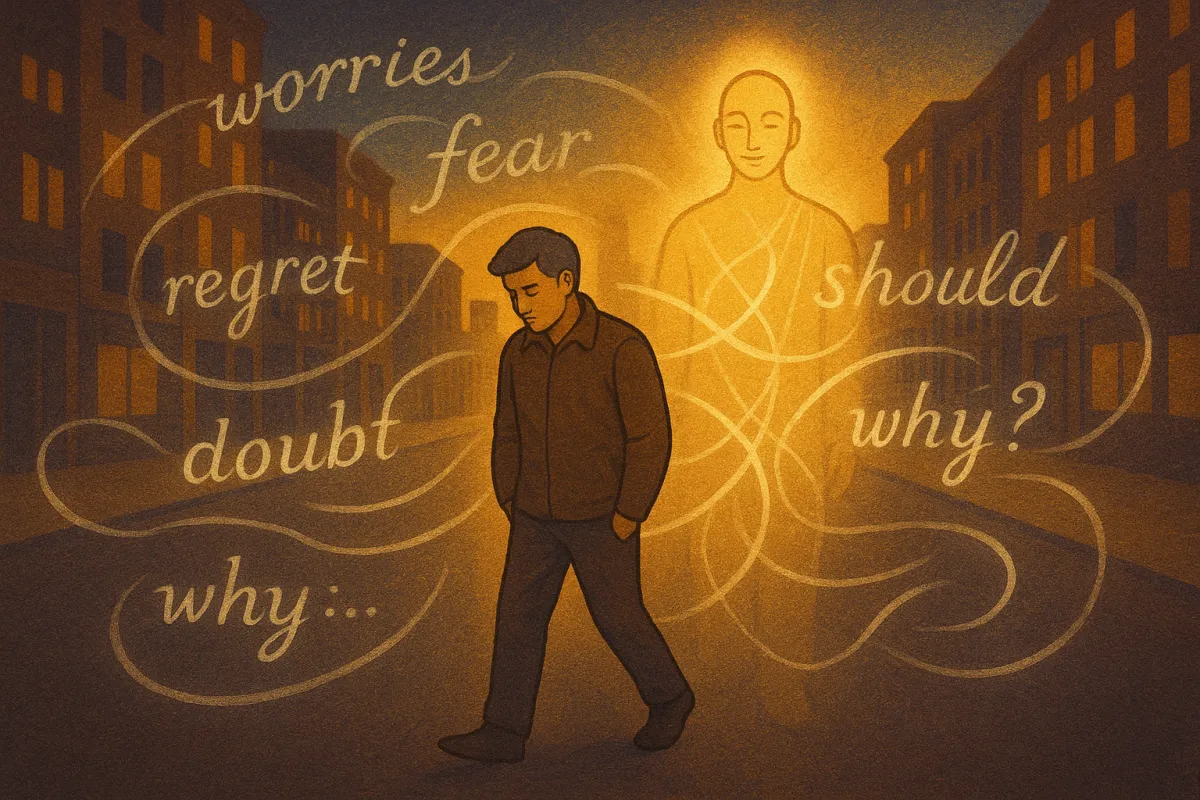
Why Your Mind Attacks You (And When Meditation Won't Help)
"Yoga Philosophy addresses root causes. It teaches you to distinguish between mind-created suffering and circumstance-created stress. It gives you tools for both."
"I was walking down the street, minding my own business, and my mind attacked me."
This phrase from our recent class perfectly captures something every successful person knows but rarely talks about: Your mind can turn on you without warning.
You're living your life. Maybe you're successful, maybe things are going well. Then suddenly—anxiety, spiraling thoughts, emotional chaos. It feels like your own mind is working against you.
The Attack You Don't See Coming
Picture this: You send a thoughtful message to someone you care about. They respond with a single letter: "K."
What happens next?
Your mind launches into overdrive: "They don't care about me. I overshared. I'm too much. They're upset. I ruined everything."
Within seconds, you've created an entire emotional drama from one letter.
This is your mind attacking you with stories, interpretations, and meanings that may have nothing to do with reality. The person might have been driving, busy, or simply acknowledging your message. But your mind doesn't care about facts—it creates stories.
Why Successful People Struggle Most
Here's what nobody tells high achievers: The same mental intensity that creates external success can create internal chaos.
Your analytical mind that solves complex problems at work? It turns that same relentless focus on every interaction, every decision, every possible threat to your security.
You've trained your mind to be hypervigilant, to anticipate problems, to control outcomes. No wonder it feels like it's attacking you—you've programmed it to be a guard dog that never sleeps.
The Billboard Problem
Ancient yoga philosophy describes this perfectly through what we call the "billboard metaphor."
When you're standing right next to a massive billboard, you can't read the message. You're too close. You see fragments, colors, confusion—but not the whole picture.
This is exactly what happens when you're in the middle of mental chaos.You're so close to your problems, your anxiety, your racing thoughts that you can't see clearly. You can't find solutions because you don't have perspective.
The practice isn't about stopping your thoughts. It's about stepping back far enough to see the whole billboard.
When Meditation Won't Save You
Here's the harsh truth most wellness culture won't tell you: Sometimes the problem isn't your mindset. Sometimes it's your actual life.
As Serenity shared in our class: "If I practice with rigor and discipline but I continue to be surrounded by people who cross my boundaries, who disrespect me, and I work at a job that makes me feel like throwing up every morning, I will not experience peace—no matter how hard I practice."
This is spiritual bypassing at its worst. Trying to meditate your way out of toxic relationships, soul-crushing jobs, or environments that constantly trigger your nervous system.
You can't breathe your way out of a genuinely harmful situation. Sometimes you need to change your life, not just your thoughts about your life.
The Witness Within
But here's where it gets interesting: You are not your thoughts.
When your mind is spiraling, there's a part of you observing that spiral. When you notice you're overthinking, who is doing the noticing?
That's what ancient texts call the "witness"—the part of your consciousness that can observe your mind without getting caught in its drama.
You have thoughts. You are not your thoughts.
You have emotions. You are not your emotions.
You have a mind. You are not your mind.
The Real Practice
Meditation isn't about emptying your mind from day one. That's the result, not the starting point.
The practice is learning to see the mental fluctuations—the attacks, the stories, the chaos—and not identify with them completely.
It's developing what we call "noble silence"—the ability to observe your mind's commentary without immediately believing every story it tells you.
When to Practice, When to Change
Use meditation and mindfulness when:
You're creating stories from limited information
You're too close to problems to see solutions clearly
You need to step back and gain perspective
Your thoughts are attacking you but your life circumstances are actually okay
Make life changes when:
You're in genuinely toxic relationships or environments
Your job consistently violates your values
People regularly cross your boundaries
External stressors are overwhelming your nervous system
The Sophisticated Approach
This isn't about choosing between inner work OR outer changes. Sophisticated practitioners understand when to use which tool.
Sometimes you need to witness your thoughts and gain perspective. Sometimes you need to quit the job, end the relationship, or change your environment.
The wisdom is knowing the difference.
Beyond Surface-Level Solutions
Most wellness advice treats symptoms: "Just meditate more. Think positive thoughts. Practice gratitude."
Real yoga philosophy addresses root causes. It teaches you to distinguish between mind-created suffering and circumstance-created stress. It gives you tools for both.
Your Mind as Ally, Not Enemy
The goal isn't to defeat your mind or stop it from having thoughts. The goal is to develop a different relationship with it.
When you understand how your mind creates stories, when you can step back like viewing a billboard from a distance, when you know the difference between inner work and outer changes—your mind becomes an ally in your growth instead of an enemy attacking your peace.
Ready to develop sophisticated tools for working with your mind? Join our weekly practices in the Yoga Mārga Skool community where we explore the deeper layers of consciousness that most basic training never covers. Because sometimes the solution isn't another meditation app—it's understanding how your mind actually works.